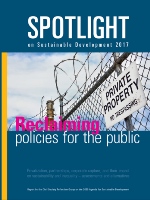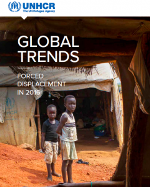Published on Mon, 2017-07-10 13:55
Colombia’s National Development Plan 2014-2018 prioritizes the development of the different productive sectors, mainly the infrastructure sector, energy and mining, as well as hydrocarbons, encouraging the participation of private firms. The Colombian government proposes that the mining-energy and hydrocarbon sectors will play a key role in ensuring sustained and inclusive economic development, as they will generate significant resources to finance investments that serve to consolidate peace and fight against inequality. However, the productive sectors mentioned have been one of the main focuses of social conflict in the country because of their impact on human rights and the environment. |
Published on Mon, 2017-07-10 13:39
Global report assesses how privatization and corporate capture have become obstacles to progress under the 2030 Agenda New York, 10 July 2017: A global coalition of civil society organizations and trade unions presents today the report Spotlight on Sustainable Development 2017. It is published on the opening day of the High Level Political Forum at the United Nations in New York. The report provides the most comprehensive independent assessment of the implementation of the 2030 Agenda and its Sustainable Development Goals (SDGs). |
Published on Fri, 2017-07-07 12:03
Invitation to Side Event at the HLPF 2017 SDG 1 and Inequality organized by the Government of Togo, Global Call to Action Against Poverty (GCAP), Social Watch, International Forum of NGO Platforms (IFP), ATD Fourth World, Action for Sustainable Development, African Platform for Social Protection, Asia Civil Society Partnership on Sustainable Development (APSD) and CIVICUS World Alliance for Citizen Participation. |
Published on Fri, 2017-06-30 18:06
While commending the institutions of the European Union for their gradual achievements in the field of safeguards and remedies over sanctions, these steps need to be further reinforced, a United Nations human rights expert has said. This recommendation has come in an end-of-mission statement by Mr Idriss Jazairy, UN Special Rapporteur on the negative impact of unilateral coercive measures on the enjoyment of human rights. |
Published on Fri, 2017-06-23 11:29
On the 19th of June the UN Refugee Agency (UNHCR) released its annual report on “Global Trends on forced displacement” for 2016. The report collects the yearly data on the different categories of people affected by forced displacement: refugees, returned refugees, asylum seekers, Internal Displaced People (IDPs), returned IDPs, stateless people and other persons of concern to UNHCR. Forced displacement worldwide at its highest in decades. UNHCR’s annual Global Trends report says an unprecedented 65.6 million people were uprooted from their homes by conflict and persecution at the end of 2016, which is an increase of 300,000 from 2015. This is a record number, higher than the previous record set in 2015. The distribution of this number among the categories of the report shows that that 22.5 million are refugees, 40.3 million are IDPs, 2.8 million are asylum seekers, and finally 3.2 million reported stateless people – however, the total number of stateless people is estimated to be 10 million. |
SUSCRIBE TO OUR NEWSLETTER







